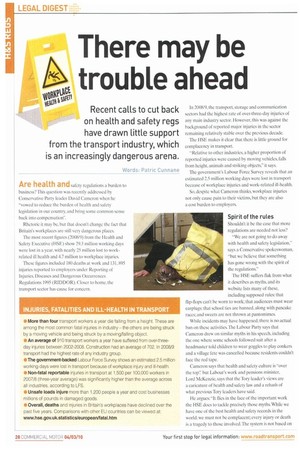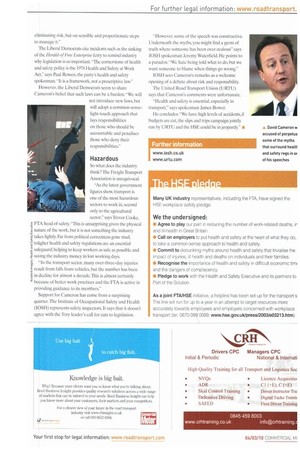There may be trouble ahead
Page 28

Page 29

If you've noticed an error in this article please click here to report it so we can fix it.
Recent calls to cut back on health and safety regs have drawn tittle support from the transport industry, which is an increasingly dangerous arena.
Words: Patric Cunnane
Are health and safety regulations a burden to business? This question was recently addressed by Conservative Party leader David Cameron when he "vowed to reduce the burden of health and safety legislation in our country, and brine sonic common sense hack into compensation-.
Rhetoric it may be. but that doesn't change the fact that Britain's workplaces are still very dangerous places.
The most recent figures (2008/9) from the I Iealth and Safety Executive (HSE) show 29.3 million working days were lost in a year, with nearly 25 million lost to workrelated ill health and 4.7 million to workplace injuries.
These figures included 180 deaths at work and 131.895 injuries reported to employers under Reporting of injuries. Diseases and Dangerous Occurrences Regulations 1995 (RIDDOR). Closer to home. the transport sector has cause for concern. In 2008/9, the transport, storage and communication sectors had the highest rate of over-three-day injuries of any main industry sector. However, this was against the background of reported major injuries in the sector remaining relatively stable over the previous decade.
The USE makes it clear that there is little ground for complacency in transport.
"Relative to other industries, a higher proportion of reported injuries were caused by moving vehicles, falls from height, animals and striking objects," it says.
The government's Labour Force Survey reveals that an estimated 2.5 million working days were lost in transport because of workplace injuries and work-related ill-health.
So, despite what Cameron thinks, workplace injuries not only cause pain to their victims, but they are also a cost burden to employers
Spirit of the rules
Shouldn't it be the case that more regulations are needed not less?
"We are not going to do away with health and safety legislation," says a Conservative spokeswoman, "but we believe that something has gone wrong with the spirit of the regulations."
The HSE suffers flak from what it describes as myths, and its website lists many of these, including supposed rules: that flip-flops can't he worn to work: that audiences must wear earplugs: that school ties are banned, along with pancake races: and sweets are not thrown at pantomimes.
While incidents may have happened, there is no actual ban on these activities.'llie Labour Party says that Cameron drew on similar myths in his speech, including the one where some schools followed suit after a headmaster told children to wear goggles to play conkers and a village fete was cancelled because residents couldn't face the red tape.
Cameron says that health and safety culture is "over the top': but Labour's work and pensions minister, Lord McKenzie, says that the Tory leader's views are a caricature of health and safety law and a rehash of what previous Tory leaders have said.
He argues: "It flies in the face of the important work the HSE does to tackle precisely those myths. While we have one of the best health and safety records in the world, we must not be complacent: every injury or death is a tragedy to those involved. The system is not based on
eliminating risk, but on sensible and proportionate steps to manage it."
The Liberal Democrats cite incidents such as the sinking of the Herald of Free Enterprise ferry to remind industry why legislation is so important. "The cornerstone of health and safety policy is the 1974 Health and Safety at Work Act," says Paul Rowen, the party's health and safety spokesman. "It is a framework, not a prescriptive law."
However, the Liberal Democrats seem to share Cameron's belief that such laws can be a burden. "We will
not introduce new laws, but will adopt a common-senselight-touch approach that lays responsibilities on those who should be accountable and penalises those who deny their responsibilities.
Hazardous
So what does the industry think? The Freight Transport Association is unequivocal.
"As the latest government figures show, transport is one of the most hazardous sectors to work in, second only to the agricultural sector," says Trevor Cooke.
PTA head of safety. "This is unsurprising given the physical I nature of the work, but it is not something the industry k takes lightly. Far from political correctness gone mad,
tougher health and safety regulations are an essential
safeguard. helping to keep workers as safe as possible and 10 saving the industry money in lost working days. t "In the transport sector, many over-three-day injuries 7.,g result from falls from vehicles, but the number has been .°4 in decline for almost a decade. This is almost certainly • 1 because of better work practices and the PTA is active in providing guidance to its members."
Support for Cameron has come from a surprising quarter. The Institute of Occupational Safety and Health (IOSH) represents safety inspectors. It says that it doesn't agree with the Tory leader's call for cuts to legislation. "However. ,k wile of the speech was constructive. Underneath the myths, you might find a germ of truth where someone has been over-zealous" says IOSH spokesman Jeremy Waterfield. He points to a paradox: "We hate being told what to do, but we want someone to blame when things go wrong."
10S11 sees Cameron's remarks as a welcome opening of a debate about risk and responsibility.
The United Road Transport Union (URTU) says that Cameron's comments were unfortunate.
"Health and safety is essential, especially in transport." says spokesman James Bower.
He concludes: "We have high levels of accidents, if budgets are cut, the slips and trips campaign jointly run by URTU and the HSE could be in jeopardy." a
































































































































